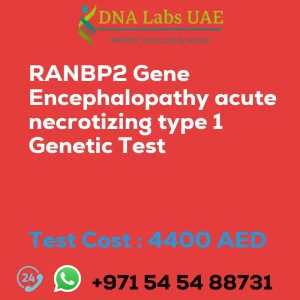KCNA2 Gene Early Infantile Epileptic Encephalopathy Type 32 Genetic Test
At DNA Labs UAE, we offer the KCNA2 Gene Early Infantile Epileptic Encephalopathy Type 32 Genetic Test. This test is designed to diagnose individuals with early infantile epileptic encephalopathy type 32 (EIEE32), a rare genetic disorder characterized by seizures that begin in infancy.
Test Details
The KCNA2 gene is associated with EIEE32. This disorder is caused by mutations in the KCNA2 gene, which provides instructions for making a protein called a voltage-gated potassium channel. This channel helps regulate the flow of charged particles (ions) in and out of cells in the brain and other tissues.
Our NGS genetic test for EIEE32 involves analyzing the DNA sequence of the KCNA2 gene to identify mutations or changes that may be causing the disorder. This type of test can help diagnose EIEE32 in individuals with symptoms of the disorder and can also be used to identify carriers of KCNA2 mutations in families with a history of the disorder.
Early diagnosis and genetic testing can help guide treatment and management of EIEE32. By identifying the specific genetic mutation causing the disorder, healthcare professionals can develop personalized treatment plans for patients.
Test Components and Price
The KCNA2 Gene Early Infantile Epileptic Encephalopathy Type 32 Genetic Test is priced at 4400.0 AED. The test requires a blood sample, extracted DNA, or one drop of blood on an FTA card.
Report Delivery
Once the sample is received, the report will be delivered within 3 to 4 weeks. Our team of experts will thoroughly analyze the genetic data to provide accurate and reliable results.
Referring Doctor and Test Department
The KCNA2 Gene Early Infantile Epileptic Encephalopathy Type 32 Genetic Test is recommended by neurologists specializing in neurological disorders. The test is conducted in our Genetics department.
Pre-Test Information
Prior to the test, it is important to provide the clinical history of the patient who is undergoing the KCNA2 Gene Early Infantile Epileptic Encephalopathy Type 32 NGS Genetic DNA Test. Additionally, a genetic counseling session may be conducted to draw a pedigree chart of family members affected with KCNA2 Gene Early Infantile Epileptic Encephalopathy Type 32.
Genetic counseling can help individuals and their families understand the inheritance pattern of the disorder and make informed decisions about family planning and potential treatment options.
At DNA Labs UAE, we are committed to providing accurate and reliable genetic testing services. Our KCNA2 Gene Early Infantile Epileptic Encephalopathy Type 32 Genetic Test can help diagnose this rare genetic disorder and guide treatment decisions. Contact us today to learn more or schedule a test.
| Test Name | KCNA2 Gene Early infantile epileptic encephalopathy type 32 Genetic Test |
|---|---|
| Components | |
| Price | 4400.0 AED |
| Sample Condition | Blood or Extracted DNA or One drop Blood on FTA Card o |
| Report Delivery | 3 to 4 Weeks |
| Method | NGS Technology |
| Test type | Neurological Disorders |
| Doctor | Neurologist |
| Test Department: | Genetics |
| Pre Test Information | Clinical History of Patient who is going for KCNA2 Gene Early infantile epileptic encephalopathy type 32 NGS Genetic DNA Test A Genetic Counselling session to draw a pedigree chart of family members affected with KCNA2 Gene Early infantile epileptic encephalopathy type 32 |
| Test Details |
The KCNA2 gene is associated with early infantile epileptic encephalopathy type 32 (EIEE32), a rare genetic disorder characterized by seizures that begin in infancy. The disorder is caused by mutations in the KCNA2 gene, which provides instructions for making a protein called a voltage-gated potassium channel. This channel helps regulate the flow of charged particles (ions) in and out of cells in the brain and other tissues. A NGS genetic test for EIEE32 involves analyzing the DNA sequence of the KCNA2 gene to identify mutations or changes that may be causing the disorder. This type of test can help diagnose EIEE32 in individuals with symptoms of the disorder and can also be used to identify carriers of KCNA2 mutations in families with a history of the disorder. Early diagnosis and genetic testing can help guide treatment and management of EIEE32. |








